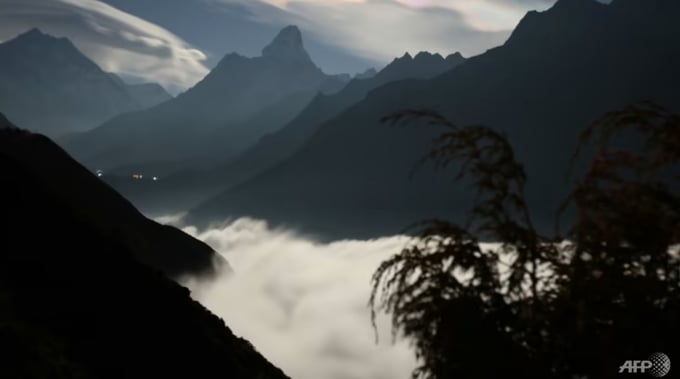May 21, 2025 | 07:29 GMT +7
May 21, 2025 | 07:29 GMT +7
Hotline: 0913.378.918
May 21, 2025 | 07:29 GMT +7
Hotline: 0913.378.918

Climate-driven changes in the Amazon basin have knock-on effects on Tibetan Plateau 20,000 kilometres away, scientists say. Photo: AFP
Planet-heating pollution from human activities is raising global temperatures and scientists have said this is pushing crucial ecosystems and whole regions towards often irreversible changes.
Vulnerable areas include melting polar ice sheets that could cause metres of sea-level rise, as well as the Amazon basin, where tropical forests are at risk of turning into savannah.
But can one tipping point have a domino effect on another region? Recent research suggests this is already happening.
Climate-driven changes in the Amazon basin have knock-on effects on the Tibetan Plateau 20,000 kilometres away, scientists in China, Europe and Israel reported in Nature Climate Change earlier this month.
"We've been surprised to see how strongly climate extremes in the Amazon are connected to climate extremes in Tibet," said co-author Jurgen Kurths from Potsdam Institute for Climate Impact Research.
The researchers used global near-surface temperature data over the last 40 years to map out a pathway of climate links. They stretched from South America to Southern Africa, on to the Middle East and finally into the Tibetan Plateau.
In their study, the researchers then used computer simulations to track how global warming might change these long-distance link-ups out to 2100.
They found that when it gets warmer in the Amazon, temperatures also rise in Tibet. But when rain increases in the South American rainforest, snowfall decreases in the Himalayan region, sometimes called the "third pole".
"TIPPING CASCADES"
Using snow cover data, the scientists also detected what they say are early warnings the Tibetan Plateau has been approaching a tipping point of its own since 2008.
The Tibetan Plateau supplies a substantial proportion of the water needs of almost two billion people across South Asia, Southeast Asia and China.
Research published in Nature Climate Change last year said climate change could deplete terrestrial water storage over the Tibetan Plateau, which may ultimately threaten water availability downstream.
Other studies have shown a warming trend in recent decades in the region which - like the Arctic region - is warming two to three times faster than the global average.
But Kurths said the proximity to a potential point-of-no-return transition had been "overlooked so far".
The researchers said that while their study suggests a heightened risk of "tipping cascades" it was unlikely that the climate system as a whole would flip into a new state.
"Yet, over time, sub-continental tipping events can severely affect entire societies and threaten important parts of the biosphere," said co-author Hans Joachim Schellnhuber from PIK.
"This is a risk we should rather avoid."
To avoid the worst impacts of warming, countries have agreed to keep temperatures from rising above the limit of well below two degrees Celsius since the mid-1900s, and preferably below 1.5C.
For that to be achieved, planet-heating greenhouse gas emissions, mainly from fossil fuels, must decline some 45 per cent compared to 2020 levels by the end of this decade, and to net zero by mid-century, according to the United Nation's climate science advisory body.
(AFP)

(VAN) Attempts to bring down the price of the Japanese staple have had little effect amid a cost-of-living crisis.

(VAN) Fourth most important food crop in peril as Latin America and Caribbean suffer from slow-onset climate disaster.

(VAN) Shifting market dynamics and the noise around new legislation has propelled Trouw Nutrition’s research around early life nutrition in poultry. Today, it continues to be a key area of research.

(VAN) India is concerned about its food security and the livelihoods of its farmers if more US food imports are allowed.

(VAN) FAO's Director-General emphasises the need to work together to transform agrifood systems.

(VAN) Europe is facing its worst outbreak of foot-and-mouth since the start of the century.

(VAN) The central authorities, in early April, released a 10-year plan for rural vitalization.